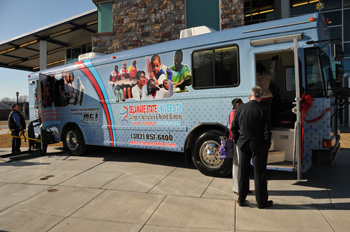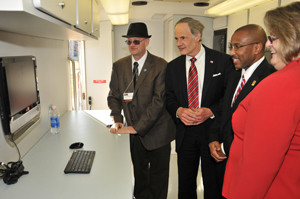DSU Unveils Mobile Entrepreneurial Training Bus
DSU’s Delaware Center for Enterprise Development (DCED) and its College of Agriculture and Related Sciences’ Cooperative Extension have unveiled a new Mobile Entrepreneurial Training Program (MET) that will take business and agriculture-related education to underserved rural areas of Lower Delaware.
|
|
DSU President Harry L. Williams was joined by U.S. Senator Thomas R. Carper for a ribbon-cutting held at the Martin Luther King Student Center.
A central feature of the new program has been the renovation of a DSU bus into a mobile classroom that will allow the DCED and the College of Ag to take workshops into underserved areas in Kent and Sussex counties. The bus is outfitted with computers, lighting, Wi-Fi capability, desktops and seating areas
Dr. Williams and Sen. Carper were joined in a ribbon-cutting dedication of the MET Bus by Dr. Dyremple Marsh, dean of the College of Agriculture and Related Sciences; Dr. Shelton Rhodes, dean of the College of Business; Lillie Crawford, director of the DCED; Jody Raskind, chief of the Small Business Administration; Bruce Weaver, USDA program specialist; and Ilona Figat, MET director.
Sen. Carper said that supporting “budding entrepreneurs” is one of the best things that can be done for economic recovery in Delaware and the nation.
“This classroom on wheels will bring the resources and tools to those in rural parts of our state who might not ordinarily have easy access to business training,” Sen. Carper said. “As Governor, I supported this type of education through the Delaware Center for Enterprise Development, and I am so thrilled to see this concept ‘hit the road’ to reach potential entrepreneurs in our state.”
Dr. Williams noted that such outreach is a strong characteristic of the University’s core values.
“This new community outreach is consistent with the established vision of DSU,” said DSU President Williams. “In taking our business and agriculture workshops out to the underserved rural areas, we are helping the people who access such education to be more successful and thereby invigorate the economy more in Delaware.”
The DCED will offer workshops on topics such as financing, marketing, business plan development, and other areas. The College of Ag’s Cooperative Extension will offer workshops that address the needs of the small farmers and other micro-entrepreneurs.
|
|
Ilona Figat, a DCED consultant, is serving as the founding director of the MET Program. She has been with the DCED for 12 years and has been instrumental in the development of various other programs such as the Child Care Business Development and Small Business Institute programs.
Ms. Figat said that in the course of scheduling the workshops over the years, it was evident that transportation was a barrier for people in the underserved rural areas. “We kept hearing ‘we can’t come up to Dover,’ which led to thoughts about how to bring our trainings to them,” she said. “Developing our MET classroom was a great fit, and we are very excited about servicing these areas in a mobile classroom with high-tech computers and Wi-Fi capability.”
The MET Bus is also refurbished in ways that are consistent with the University’s “Go Green” environmental sustainability efforts. The bus refurbished features are designed to reduce energy consumption, which includes energy efficient computer workstation that draws less than 25 watts each. Florescent and LED lights have also been installed. The bus is being converted to run on locally produced bio-diesel.
The DCED has been supported in this program with funding from a three-year $175,500 Small Business Administration PRIME grant as well as a one-year $72,000 USDA Rural Development grant.


 The Mobile Entrepreneurial Training Bus will take business and agriculture-related workshops to the rural areas of Kent and Sussex counties.
The Mobile Entrepreneurial Training Bus will take business and agriculture-related workshops to the rural areas of Kent and Sussex counties. Christopher Garland, College of Business IT manager, checks out the MET Bus computers along with U.S. Sen. Thomas R. Carper, DSU President Harry L. Williams, and Ilona Figat, MET director.
Christopher Garland, College of Business IT manager, checks out the MET Bus computers along with U.S. Sen. Thomas R. Carper, DSU President Harry L. Williams, and Ilona Figat, MET director.